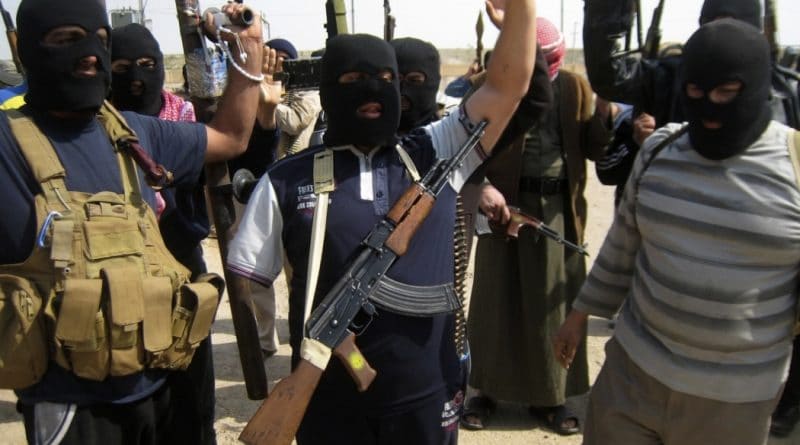Kyrgyzstan wants to tighten punishment for mercenaries and terrorists
The State Committee for National Security of Kyrgyzstan (SCNS) proposes to toughen the punishment for Kyrgyz citizens who took part in armed conflicts in foreign countries or received special training in terrorist camps. Corresponding amendments to the Criminal Code have already been submitted for public discussion.
According to the new edition of the Criminal Code of the Kyrgyz Republic, which entered into force on January 2019, it is explained in the certificate of justification, this crime belongs to the category of less serious ones and is punishable by 2.5-5 years’ imprisonment. To convicted person under this article parole can be applied, as well as probationary supervision without isolation and imprisonment. According to the department, it allows a person, who has undergone terrorist training abroad, to remain at large and realize criminal intent.
In the last version of the Code, the crime was classified as serious. The State Committee for National Security underlines that this article is similar to the “Mercenary” article, for violation of which a more severe punishment is provided due to the special gravity of the crime.
“The participation of a citizen of the Kyrgyz Republic in armed conflict or military operations on the territory of a foreign state or undergoing terrorist training outside the Kyrgyz Republic poses no less, if not more, danger to the national security of the Kyrgyz Republic than mercenary activity. This is due to the fact that a mercenary is fighting for material reward, while participants in armed conflicts have direct or indirect plans to commit acts of terrorism in other countries and/or, in particular, in the Kyrgyz Republic due to the failure to recognize the foundations of the existing constitutional system of the Kyrgyz Republic. This is confirmed by the available materials on the radical ideologies of terrorist organizations banned in the Kyrgyz Republic (Islamic State, Jabhat al-Nusra, Jannat Oshiglari, Jamaat Tawhid wa Jihod, Katiba imam al-Bukhari, Union of Islamic Jihad, Islamic Movement of Uzbekistan and others),” the document says.
The department believes that if the punishment is not tightened, people, who have received terrorist training, will be able to return to the Kyrgyz Republic, using the possibility of probationary supervision as a less serious crime, while increased criminal responsibility will act as a retaliatory deterrent for departure and participation of Kyrgyz citizens in the armed conflicts or military operations in foreign countries or undergoing terrorist training. The bill proposes to punish for participation in an armed conflict or military operations on the territory of a foreign state with imprisonment for a term of 5 to 7.5 years.
Note that, according to the State Committee for National Security of the Kyrgyz Republic, at least 850 people are considered to have left for the war in Syria. According to official estimates, at least a quarter of these people died during the fighting.
In Central Asia, Kyrgyzstan is distinguished from its neighbors by the mildest approach in the fight against extremism. In the Kyrgyz Republic an attempt to join the warring factions can turn into just a suspended sentence. And, for example, in Kazakhstan since 2017, people participating in hostilities in Syria, in addition to the prison term, could also face loss of citizenship. In Uzbekistan, there is an article for mercenaries, but in most cases, according to human rights activists, people are tried for terrorism. In Tajikistan, as a rule, we are also talking about long terms (however, the country’s authorities can pardon a convict if he returned voluntarily and repented).
Experts studying Kyrgyzstan’s anti-extremism policy note three reasons why the Kyrgyz approach to the problem is softer than that of its neighbors: limited resources to fight radicalism and the return of citizens to their homeland, a relatively democratic government and existing legislation that protects religious freedom of citizens.
For example, the activities of the religious movement “Tabligi Jamaat” (Jamaat Tablig), which is banned in China, Russia, Kazakhstan, Uzbekistan, and Tajikistan as extremist, are still allowed in Kyrgyzstan. On the recommendation of the Collective Security Treaty Organization (CSTO), the Kyrgyz authorities have been discussing the traffic ban for several years, but no concrete measures have been taken.
So far, most of the changes in toughening legislation in Kyrgyzstan have remained at the level of discussion. In 2016, the Parliament proposed to reduce the age of responsibility for extremism to 14 years, but the bill was never considered.
In April last year, the Ministry of Justice introduced a draft constitutional law for public debate proposing to deprive Kyrgyz citizenship for terrorism, financing of terrorist activities, participation in armed conflicts or military operations in a foreign country or undergoing terrorist training, for mercenary and creation of an extremist organization. The matter was limited to public discussion.




